2010.10.30[Interviews]
Competition ŌĆ£Beautiful BoyŌĆØ Interview with Shawn Ku (Director) (10/30)


---What impact did the massacre have on you, and what were you thinking while you were making the film?
I was personally shocked by the incident because the Virginia Tech is where my parents graduated from and my sister was born in that town. It was doubly shocking that the killer was Asian, and this gave me the initial inspiration. In addition, a good friend of mine died at my house, and I witnessed the distress of his family. The grief in this film was inspired by my experience of this family that is why I have dedicated the film to this friend.
I also wondered how my parents would react if I had caused a similar incident like random murder. The parents in the film are based on my parents in some parts.
---The killer in the real incident is Asian, but it is changed to a Caucasian. Why did you make the change?
One is to protect myself from being sued. Another is, regrettably, I needed to make him a Caucasian so that the viewers in America can feel the protagonist represents everyone. If he is Asian or black, the film will be regarded as a film aimed at that particular race. Only when he is a Caucasian does it become applicable to everyone. Having said that, I was conscious of other races, so I indicated the incident is not peculiar to Caucasian society by making his wife and child Asian.
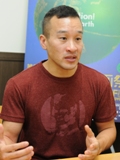
---The film has cut out explanation and information about the incident, and instead, it focuses on the parentŌĆÖs viewpoint and the world, which created the tense feeling.
Sadly, a shooting incident like this happens frequently in the U.S, flooding TV and internet with information about it. However, we tend not to hear much about the killerŌĆÖs parents. Take the Virginia Tech case. They also lost their child, too, but they are panned by the media without the time to mourn their loss.
We tend to blame someone for an incident, and the blame tends to be on the parents when the killer commits suicide, which is often the case. But it is not so simple. Looking back on when I was 17 or 18, my parents did not have full control over me, and yet people tend to come to a simple answer. I made this film from the parentsŌĆÖ viewpoint for these reasons.
---Why did you choose the British actor, Michael Sheen, for the father? His English sounded American, and he looked plumper than in his other films.
He is a great actor, and I am his fan. ItŌĆÖs a small film, but since he plays a lot of actual persons with social status, I thought he might want to play an ordinary father, and he did.
We didnŌĆÖt discuss about the accent in the initial meeting. If he comes up with American accent, thatŌĆÖs fine, but if it doesnŌĆÖt work out, I was happy to set the father as British, but he came prepared with an American accent. I noticed he may have gained some weight, but I could not possibly ask him that (laugh). I think he suited the part even better with the slight weight gain anyway.
He wanted his costumes loosely fitted because he wanted his character to look natural rather than to look good. So I suspect the weight gain may have been intentional.
---The parents looked happy in suburbia, but they are affluent materially, while the family tie has become a mere fa├¦ade. The film seems to have incorporated that, too.
Indeed. Many photos are displayed in that house. They may have been happy for real in the past, but they are only trying to convince themselves of their happiness. Beautiful house, good job, the family looks perfect on the outside, but the couple have separate bedrooms. They are maintaining appearances, but their relationship has broken down. I wanted to show that, too.
---Apart from the shooting incident, this film also seems to have a universal story about a family, who loose everything, then reconfirm each other as individuals.
I am glad you viewed it that way. I wanted the audience to empathize with the characters. Viewers tend to empathize with either of the couple, but not both. Someone went home after the film and hugged his/her child ŌĆō that was the best compliment for me. If this film influences your relationship with other people, I would be really pleased.
The subprime loan crisis and the Lehman collapse, which sent a shock wave throughout the U.S., go back to the American dream to own a house. Owing a house is not a bad thing in itself, but that alone does not realise your dream or bring happiness. This film provokes thoughts like that, too. This is the emergence of another talented director in the U.S.
Beautiful Boy
ŌåÆFilm Infomation
2010.10.30[Interviews]
natural TIFF "The Happy Poet" Interview with Paul Gordon(Director) (10/30)


---Do you have a distributor yet?
I met a couple of distributors in Venice, a Greek distributor, and a Polish distributor. So it looks like we have some distribution in Greece and Poland.
---Did they say what appealed to them about the movie?
They were just real complimentary. They liked it a lot, I guess.
---What's your background as a filmmaker and an actor?
I haven't done that much acting, really. I acted in a rotoscope animated feature called "Mars." It just played in the London Film Festival. That was the biggest part that I ever had before I did this. I'd just had a few really small parts in friends' movies and short films.

---Was this your first feature?
I made a feature-length film called "Motorcycle" that played in a couple of festivals four years ago. But it was really three short films that were all connected. They had the same characters in all three of them. That played at a few festivals. Those were my three film school projects. And I had a short before I went to film school that played at some festivals called "Good," but that was 2001. So mostly I made short films. This is the first thing I've shot as a feature.
---Is "The Happy Poet" based on reality or is it completely made up?
It felt like something I pulled out of the blue, but actually we were trying to make this other film I wrote a script for. Me and my friend who helped me produce this film were trying to raise money for that other film. We got a pretty decent grant from the Austin Film Society but we weren't able to raise other money, so I just decided that that movie wasn't going to happen any time soon. But I really wanted to make something. The other film was just going to cost more, so I started with a new idea. I wanted it to be about a business, and tried to think if I knew anybody who worked in a coffee shop where their boss would let me shoot. Then I thought of a food stand, because it's a mobile business. I can park a food stand anywhere. If we got kicked out somewhere we could just move it and shoot for a couple of hours, then move somewhere else.
---It sounds as if you were shaping the movie in accordance with your financial situation.
Very much so. And I wrote the parts especially for the two other guys who were in it. I really like them as actors. They're friends of mine and I think they're funny. I thought it would be funny if I was the boss of Jon, the guy on the scooter. He really has a scooter, so I thought I could make him the delivery guy. I wrote the script in about a month and started rehearsing scenes while I was still finishing it. I realized when I was almost done writing that the story was very similar to the process of us trying to raise money for the film.
---Did you do research into organic food service?
I didn't do a ton of research. I like all the food. I just pieced together the menu from places where I like to eat in Austin, using combinations of sandwiches and things.
---What about the business part?
I did look a little bit into the process of how you get a permit to be a food vendor. But I decided not to focus on that in the film because I wanted it to be more about the relationships.
---Though the movie was selected for the natural TIFF section, probably because of the organic food element, it's more about capitalism than ecology or the environment. Did you want to say something about the business mentality?
I didn't consciously set out to say something about business, but the ending is supposed to be a ridiculous and over-the-top. I was having fun with the stereotypical happy endings you see in a lot of movies.
---I wasn't sure how the business suddenly became successful.
I thought about explaining that more, but I like having the ending suddenly just happen and you're in this new world. It's why all the women in the end are pregnant. In happy endings they always have surprise pregnancies to make it extra happy. I wanted to show that the main character thinks he's really happy because everything seems so perfect. But he's not really any happier than he was before. He's the same at the end, and he even says, "I've never been this happy before," but he doesn't look it. It's subtle. I don't know if people pick up on that.
---He's a subtle character, anyway. Most of the humor is derived from his dispassionate attitude. Bill obviously has principles but can't always stand up for them.
I thought of him as an idealistic character, but I never thought of him as being inspirational. I did want him to stand up for himself at some point in the movie. I thought it would be satisfying for him finally to stand up for himself and be a more active character. That isn't to say he isn't active at all during the rest of the movie.
---Actually, he's pro-active, since he started his own business. In that regard, it's a typically American story, especially when you have all these other people complaining about their jobs. Is that something you identify with?
Yeah. If you're trying to do something arts-related you have to have other jobs that you don't necessarily like very much. When he starts the food stand it's his attempt to finally do something practical. And, of course, he does it in a really impractical way. He can't help it. He's idealistic to a fault.
---Is that why he's so disappointed with Donnie when he finds out Donnie is selling drugs?
Bill sees it as a betrayal. It also comes at a time when the business isn't going so well. Things are getting worse in general, so he's extra mad at him. He thinks, "He's just been using me. He never even wanted to help with the business. He just saw this as an opportunity to be able to ride around town and sell weed to people." Bill thinks he's been taken advantage of, and they've gotten to be friends at that point, so he feels especially betrayed. Bill is pretty clueless in general.
---In terms of humor, who do you find entertaining?
I've always liked Richard Pryor. I like Alexander Payne's movies. I think those are funny. I actually like David Lynch movies. There's a lot of subtle humor in them. "Blue Velvet." There's some hilarious stuff in that.
---You're not interested in more obvious forms of humor, like slapstick.
Not much. But I did like "The Blues Brothers" and "Pee Wee's Big Adventure." As for present-day comedies, maybe a few, but not many. "Old School" was pretty funny, but it didn't strike me as funny as David Lynch's humor, or Steven Soderbergh's.
---What was the movie that you originally wanted to make about?
It was about a young African-American woman who lives in Chicago and steals a motorcycle. She rides out into the country and starts camping out on the abandoned farm on the edge of a white farm community. There's a retired priest who lives next door who she becomes friends with. It's a less conventional narrative than "The Happy Poet." With "The Happy Poet" I thought it would be fun to play with a conventional structure. That other script has a less conventional structure and more unusual characters. The characters in "The Happy Poet" are stock characters, but the tone, the sense of humor, the way it's shot makes it different from a typical movie.
---Do you prefer plot-driven movies or character-driven movies?
The two go hand-in-hand. The plot should come from the characters. I like playing around with characters. My favorite thing in the movie is the relationship between my character and Donnie. I like interesting relationships.
---Thanks to Richard Linklater's movies, Austin has a reputation for being a city where everybody is almost too relaxed. Your movie reinforces that reputation. Is Austin really like that?
When I was writing the movie I never consciously thought about trying to make is seem like a typically Austin story. It's a big college town so there are a lot of people who went to school there and just end up staying; people with master's degrees who are getting into their 40s and are still working at coffee shops. So, yeah, there are a lot people like that in Austin who hang around and philosophize and still live the life of a kid. They don't get married and have families, or have serious jobs.
---Is this your first time in Japan?
Yes, I've really enjoyed it. I've been trying to do some sightseeing during my time off, but I keep getting lost in Tokyo. I'm always getting lost.
The Happy Poet

2010.10.30[Event Reports]
10/30 (Sat) Competition Section "Never Let Me Go" Press Conference and Q&A: Notes & Quotes

Press Conference: October 30th (Saturday), from 14:50 @Movie Café
Q&A: October 30th (Saturday), from 16:15 @TOHO CINEMAS ROPPONGI HILLS SCREEN7
Appearance: Mark Romanek (director)

Here are some notes and quotes:
Mark Romanek (MR): It's my first time to be in Tokyo, so I'm very excited to be here. I'm eager to have some time to see the city once IŌĆÖm done with working!
Q: Carey Mulligan, who plays Kathy is younger the actual age of the role. What was the reason for casting her? Also, did you cast the young actors before the older ones?
MR: We felt we had to cast Kathy first. The head of the studio at the time saw Carey in An Education at the Sundance Film Festival. He was very excited and told us that we had to see this girl, so we auditioned her and agreed that she was amazing. Then the other actors were casted. Once we were done with that, we casted the younger children because it was important to me that they not only be wonderful actors but that they strongly resemble their older counterparts. I had a wonderful casting director called Kate Dowd and she looked at thousands of children. I didnŌĆÖt want professional actor children because their performances are not very affecting so she went to many schools to look for children. Kate then narrowed it down to 40 children per role so the cast is really due to her hard work.
Q: How was the writer of the novel, Kazuo Ishiguro, involved in making this film?
MR: I like to describe him as a benevolent uncle to the project. Mr. Ishiguro was very gracious and trusting and allowed us to make the film as we wanted but at the same time, he made himself available to us at key junctures in the project. He made some comments about the script but overall he approved it and was very happy with it. He couldnŌĆÖt have been lovelier.
Q: It has been a while since your last feature film. What was the main reason why you were attracted to this novel?
MR: I'm an enormous fan of Mr. Ishiguro's writing and I've read all of his books. I read Never Let Me Go the week it was published. It made me cry at the end and I couldn't stop thinking about the book, which you hear from a lot of people who read itŌĆöit just stays with you for months. It was on the second reading when I started to picture how it could perhaps be a film. I then inquired if anyone was planning to make one and found out that DNA Films, Alex Garland, and FOX Searchlight were making the film. So I auditioned for it like an actor auditions for a part. What attracted me to the story was how moving it was, how original, strange, and interesting the concept of the book was. Also, you are often sent a lot of junk but what you want is to be involved with a film of quality. Therefore, the opportunity to adapt an Ishiguro novel is impossible to pass up.

Following the Press Conference, a Q&A Session was held where the director took questions from the audience.
Q: There was a stranded boat on the beach where the 3 friends visit. Is there any kind of special symbol you wanted to give that boat?
MR: On a literal level, it's a place where they can go away, where Ruth can get them all alone so that she can make her redemption and confess her sins. On a symbolic level, I would hate to impose my idea of what that boat may mean because I want the film to be interpreting for the audience. I have my own idea about that scene, but I never asked Mr. Ishiguro about it. I think Mr. Ishiguro is against the notion of symbols in that sense. It doesnŌĆÖt have to mean more than what there is to it.
Q: This film touches upon the controversial issue of organ donation. What is your position on this?
MR: In the process of making the film, the issues and ethics of biotechnology weren't interesting to me. The science fiction aspects of the film were a metaphor that Mr. Ishiguro invented to address much more universal themes about human existence and the fact of our mortality. Therefore, although the ethics of organ donation is interesting in itself, I was making a love story foremost.
Never Let Me Go

2010.10.30[Event Reports]
The Audience Award goes to "Sarah's Key", Competition Section

This year's winner was Sarah's Key, a film during the Holocaust based on a true and tragic story of the French police that conspire to persecute the French Jews. The Commendation Ceremony was held as follows:
Date/Time/Venue: October 30, 2010 (Saturday) from 15:30 @ Movie Café
Appearance: Gilles Paquet-Brenner (director/script)
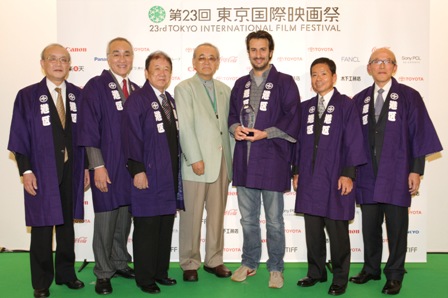
At the commendation ceremony, Director Gilles Paquet-Brenner who also wrote the screenplay was called upon the stage with a big round of applause. He was presented with a commendation certificate from Deputy Mayor Kenji Yamada, 10,000 US dollar worth of prize money from Minato City Committee Chairman Tamotsu Hara, a trophy from Vice-Chairman Tatsuo Sunaga, and a bouquet of flowers from Vice-Chairman Shinji Aono. Paquet-Brenner slipped into the happi coat presented by Secretary General Masahide Hanazumi of the Minato Sports, Community, Culture, and Health Foundation, before he addressed the audience.
Gilles Paquet-Brenner: Thank you very much! Now I can pay my taxes! Also, thank you for the happi coatŌĆöI was jealous when I saw everybody wearing this on stage!
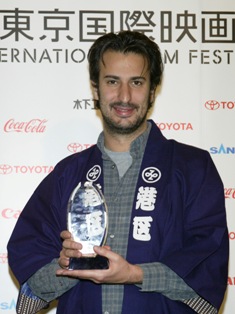
More seriously... I am extremely delighted. As you know, the Audience Award is a very special award because we make films for the audience. I am glad to know that the emotion of this film that is based on a very specific matter in World War II travels around the world and that it completely universal. I am surprised and happy that the Japanese audience is sensitive to it. Before screening the film, I asked the audience if they were interested in history and they said "No". I think the past is very important because we need the past to build our future. Therefore, it really means a lot to me that the Japanese audience enjoyed this film and chose it for this award.
Lastly, I would sincerely like to thank all the people involved in this festival who were absolutely amazing. Of course, thank you for inviting us and big thanks to the audience for choosing us and for your amazing response. Arigato!
...And to all the photographers here, I'd like your photo of me for my mother!
Congratulation to the director, Gilles Paquet-Brenner!!
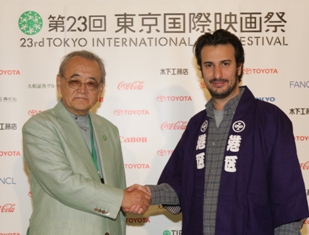
2010.10.30[Event Reports]
Photo Report: 10/30 Guest Appearance
FIT: Stage Greeting @ TOHO CINEMAS ROPPONGI HILLS SCREEN1
Guest: Hiromasa Hirosue(Director/Screenplay/Editor/Cinematographer), Akie Namiki(Screenplay/Cinematographer/Continuity/Actress), Midori Shine(Actress), Yui Oouchi (Actress)
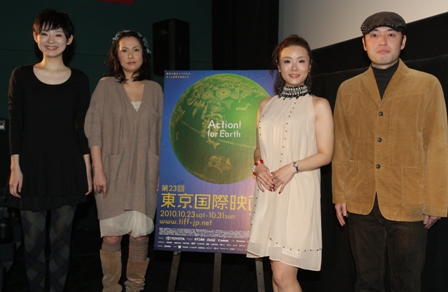
Japanese Eyes
Successional Tradition of Noh: Stage Greeting @ TOHO CINEMAS ROPPONGI HILLS SCREEN6
Guest: Chiseko Tanaka(Producer/Director), Shoroku Sekine(Noh performer), Shiro Sano(Actor)
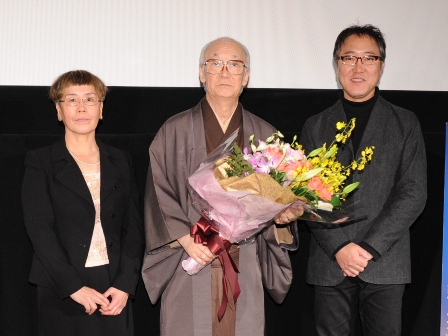
Competition
Never Let Me Go: Press Conference @ TIFF movie café
Guest: Mark Romanek(Director)
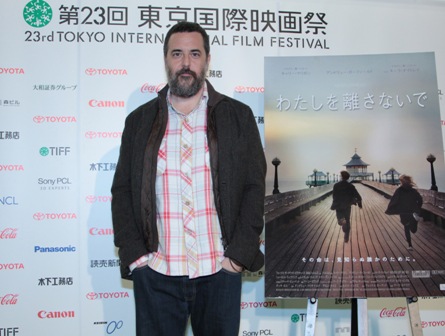
Competition
The Invisible Eye: Q&A @ TOHO CINEMAS ROPPONGI HILLS SCREEN6
Guest: Diego Lerman(Director/Screenplay/Producer), Julieta Zylberberg(Actress)
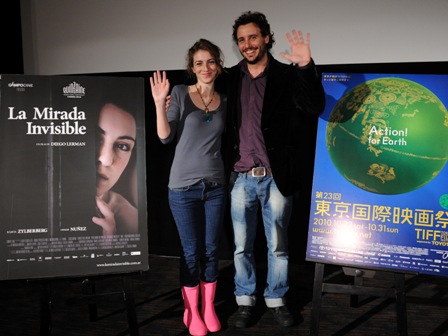
Competition
Beautiful Boy: Press Conference @ TIFF movie cafe
Guest: Shawn Ku(Director/Writer)
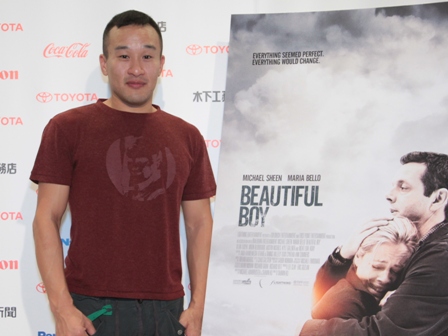
natural TIFF supported by TOYOTA
The Happy Poet: Q&A @ Cinemart Roppongi SCREEN1
Guest: Paul Gordon(Director/Producer/Screenplay/Editor)
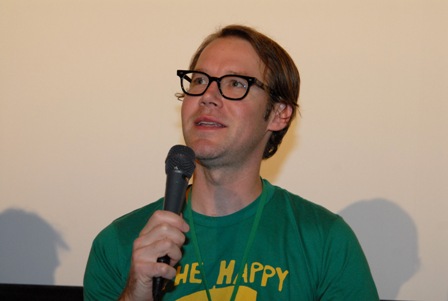
Competition
The Audience Award Commendation Ceremony: @ TIFF movie cafe
The Audience Award Winner: Sarah's Key
Award Winner: Gilles Paquet-Brenner (director/script)
Presenter: Deputy Mayor Kenji Yamada, Minato City Committee Chairman Tamotsu Hara, Vice-Chairman Tatsuo Sunaga, Vice-Chairman Shinji Aono, Secretary General Masahide Hanazumi of the Minato Sports, Community, Culture, and Health Foundation
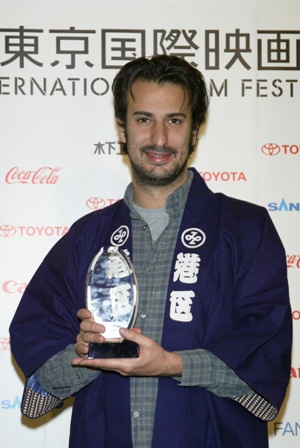
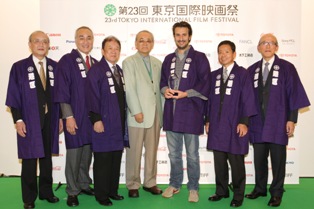
Bunka-Cho Film Week 2010 ŌĆō Here & There
Filmmaker's Angle The World of Rintaro: Conference @ TOHO CINEMAS ROPPONGI HILLS SCREEN2
Guest: Rintaro, Katsuhiro Otomo(Director), Toru Furuya(Voice Actor), Ryudo Uzaki(Musician), Sunao Katabuchi(Director)
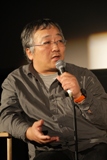
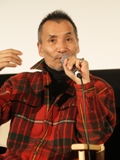
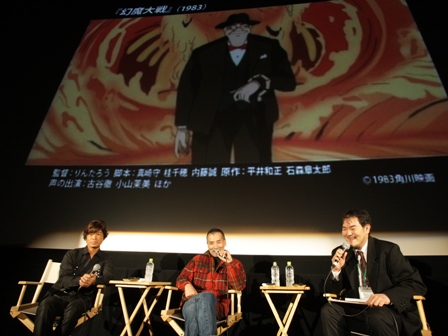
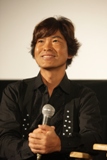
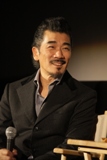
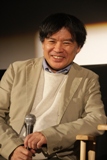
2010.10.30[Updates]
[Important!] Change of schedule due to Influence of Typhoon on The Audience Award Ceremony & Minato Screening
The Audience Award ’╝Żeremony
The Audience Award Ceremony will move it's venue to the TIFF movie café and begin the ceremony from 15:30.
Admission fee is free of charge, donŌĆÖt miss this chance.
Minato Screening
The Minato Screening scheduled today at 15:30 in TIFF park has been cancelled.
We apologize for the inconvenience this may cause you.
Hello Dial:
03-5777-8600 (Japanese)
050-5541-8600 (Japanese IP phone)
03-5777-8600 (English)
2010.10.29[Interviews]
natural TIFF "Waterlife" Interview with Kevin McMahon (Director) (10/29)


---The Great Lakes is a big subject. How did you find a focus for the documentary?
My first feature was something called "The Falls," about Niagara Falls, because when I was a reporter I worked in that region. I always had an interest in water issues and wanted to come back and make a movie about water. With the Great Lakes there are many different issues. There's poison in the water, invasive species. You could make a movie on any of these subjects. I could have made a whole film about Toronto Harbor, because there are problems there that are common in harbors all over the world. The journalistic approach is to treat them as an issue, but in order to make it work emotionally as a movie you have to find a narrative. There was this old children's book called "Paddle to the Sea," which was made into a film by the National Film Board of Canada fifty years ago. I decided to steal that. A Native American kid carves a canoe and sticks it in the water at Lake Superior and goes all through the Great Lakes to the Atlantic Ocean. I thought I'd use that story, but instead of having a canoe I'll just do it with the water. And as it turns out, I have that Native American woman in the film who is walking the whole length of the lakes.
---It must have taken years.
It took her six years, but I didn't know about her when I started shooting. It was weird that I got this person who was able to bring a narrative story line to the movie. So, to answer your question, it's sort of a fake narrative. It's the same thing Michael Moore does. He wants to look at the health care system or the financial situation, so he's creates a phony narrative. "I'm going to talk to the head of GM, or I'm going to take these people to Cuba." It's stuff that provides an emotional arc.
---Unlike Michael Moore's movies, yours isn't particularly adversarial.
I could have done that, and I thought about it. It would have been smarter and the film would have been more popular. It seems to be the only way the media knows how to operate now. We were taught that when I started out in journalism. That's Michael's whole method of operation, and I think that's what makes it popular. People like a good fight. But for me, even though I think there's a lot of culpability and there are many corporations I could attack, water is a collective story. It would be false to lay the blame on anyone in particular, because who would you pick? Here you have forty million people living around a body of water. I chose not to do that. Unfortunately, I'm fair-minded and that's why my work is not as successful as Michael Moore's (laughs).

---The balance seems careful. You have all these anonymous voiceovers, and for every statement that takes the side of business you have a refuting statement.
Somebody criticized those voiceovers, saying, "We can't tell if they're telling the truth." They may be right, but, again, it's a collective story. There is going to be back-and-forth opinions. We don't see any environmental heroes in the film, except Josephine, the Native American woman, who isn't really doing anything except this quixotic journey. I would say that the tension in the film is between, "Oh, we're really screwed because it's polluted," and "Wow, it's really beautiful." The back-and-forth is about that. Everything else is human folly. We all do these stupid things, and we end up living around a cesspool. What are we supposed to do about it?
---Someone in the movie says the lakes provide "emotional sustenance." Can you elaborate on that idea in terms of what the movie presents?
Every culture has something like that. You go to the mountains or you go to the seaside. It's literally recreation. I think that's what the person is talking about. It's what we're trying to get at with the kids playing in slow motion in the water and all the landscape footage. We're trying to reaffirm this sense that there's a lot of beauty out there, so that people realize there's something worth protecting. Here's a great thing, and it's not just, "We're screwed and the water is polluted," which is true. It's also to push this idea that there's something valuable to protect.
---Like that scene with the men in the canoes on the Chicago River. Even though the river is filthy they're still enjoying it as a waterway.
They are, sure. I mean, they're doing it to prove a point, which is that we should be able to canoe on this river, even though people would never canoe on the Chicago River. It smells bad.
---There are a lot of hard facts in the film, which would seem to make it closer to an educational film than a standard documentary.
It's part of the job. I'm a journalist at heart so I will never lose that desire to inform. Film festivals are exciting, but ultimately the legacy for a movie like this is in education. It's going to be used in schools or for public interest groups. There's a big umbrella group of Great Lakes environmental organizations who are striving to get their message across, and it's hard for them to explain something like invasive species. So the value of a film like this is that they just have to show it. I'm screening it in Chicago in the spring. There's this organization that Robert Kennedy, Jr., heads called the Waterkeepers. Their objective is for every body of water in North America to have a protective organization. They want to use the film to explain the Asian carp problem. As shown in the film, those fish are heading toward the Great Lakes and they will cause significant biological problems if they get in.
---That was quite an effective scene in the film, with the carp jumping out of the water into people's boats and nets. It really showed how aggressive they were.
They're unbelievable. But here's the thing. Since we made the film it's been found that the electric barrier erected on the river doesn't work. And they're starting to find Asian carp DNA--bits of fish eggs and scales--in Lake Michigan. So alarm bells have gone off. There's a court battle. Seven of the eight Great Lake states have launched a lawsuit against Illinois and against Chicago to make them close the river so the fish can't get in. There's a battle going on and it's hard when they go to court or go before Congress or even before the public and try to explain these matters. They can't get the point across without some kind of visual aid. So I see my role as providing the evidence of what's going on. If you read the newspapers published around the Great Lakes there would be nothing in that film you wouldn't know. But I've been to dozens and dozens of screenings around the lakes and people say, "I had no idea." Maybe it's because they don't read the newspapers, or maybe it's because until you see it in a movie that puts it all together it doesn't have the same emotional impact.
---Is that why you used animation to explain the basic science?
Some people criticized the film since they thought I couldn't decide if it's supposed to be an art movie or a science movie. I think the animations are beautiful myself, but you can't understand what it means to dump toxins into the water unless you can actually see them at the molecular level. If there were kids with two heads, it would be simple. If this were thalidomide or Minamata Disease or effects you can show in a very visceral way it would be different.
---It's difficult to show, visually, a male frog turning female because of hormonal imbalances caused by pollution. They look alike.
That's right. How do you depict the effects of DNA changes 20 years from now? That's what all these pollutants are really about. And it's something people ought to take seriously. So I felt as if I had to find a way to depict it.

---Has the movie had any effect?
People get fired up by the movie who live around there. We set up web sites to channel that energy. One is an educational endeavor aimed at kids, and the other works specifically with Waterkeepers and other environmental groups. People say, "What do I do?" And you say, "Go to the web site and there is this menu of options." And that's worked. It's ultimately political. All environmental issues are essentially related to infrastructure: Mass society consuming resources and burning stuff and shitting where we shouldn't be shitting. But there haven't been any legislative changes.
---The Great Lakes border on two countries. Does that affect the issue?
Whenever you have multiple jurisdictions it makes it easier to ignore problems. You've got Canada and the United States, and then you've got all the American states and two Canadian provinces. Canadians have a great sense of their own virtue, and they think they're very pure relative to the States, but, in fact, Americans are more engaged in the Great Lakes in terms of science and legislation and efforts to clean them up. But it's like the oceans. The oceans are a mess, because everybody can say, "It's not us. It's the country down the road there," wherever it happens to be.
---You bookend the movie with the story about the Beluga whales dying of cancer and make the point that it's difficult to blame anyone because there are no certifiable connections.
That's right, and it's the aim of the movie to show those connections. There's a guy in the movie who says, "You can never say this disease was caused by this chemical," but actually in the case of those beluga whales you can prove that the poison in them came from Lake Erie or Lake Ontario because there are things that are in them that are only made in those places. But you can't make a firm connection. Scientists talk about correlation and causation: You can say there's a correlation but that doesn't mean there's causation. The obvious example is climate change. Everybody can instinctively tell that climate change is happening and that it's probably caused by humans. What it comes down to is: Who is willing to make the sacrifice. Nobody wants to do that. If you're a petrochemical company you can say, Prove it. That's where the poets have it over the scientists. Ultimately, the solutions to these problems are political, and ultimately the motivation for political solutions is going to come from emotional truths rather than scientific truths. I don't think that any of us raised in a rational tradition would argue that that's a good thing. I prefer to rely on rationality, but in a world of electronic media there's no point in waiting for rationality to do the job. It's up to us to use the emotional content built into these tools. The danger is that you make propaganda. You don't want to make propaganda.
---That goes back to the art-versus-science argument. If you use aesthetic tools to make your point, there's always the danger of people saying. "What are you trying to do? Why not just make your point directly?"
That's the challenge. You want to include enough evidence to satisfy rational minds, but it doesn't take an understanding of complex science to get the point. Most of the factories we went to wouldn't let us shoot, except for the paper plant. They were really proud of the fact that 90 percent of the crap that they put into the water they take out. And they think that's great. But what I hear and what the audience hears is: What about the other 10 percent? You draw your own conclusions.
Waterlife

2010.10.29[Event Reports]
10/29 (Fri) Competition Section "Brighton Rock" Press Conference and Q&A: Notes & Quotes

Date & Time: October 29th (Friday), from 14:15 @Movie Café / Q&A from 13:21 TOHO Cinemas Screen 6
Appearance: Rowan Joffe (director)

Here are some notes and quotes from the both Press Conference and Q&A session:
Rowan Joffe (RJ): This is my second trip to Japan. I've had a wonderful time at the Tokyo International Film Festival. I promise you that this is my favorite film festival ever!
Q: How did the project to make this famous novel into a film?
RJ: I was approached originally by Studio Canal who are French distributors and investors who asked me if I was interested doing a remake of Brighton Rock, and I said, "No"! I don't like remakes and I don't think many people do either. But I do love the novel with all my heart and I thought to myself that maybe, just like the literary classics of Shakespeare plays, there was a chance to do another version.
Q: When and where did you first read the original novel?
RJ: I first read it at school when I was about 15 years old. It was the first piece of Graham Greene I had red. I didn't much like it back thenŌĆöI found it a very cold, dark, and difficult book. But when I was approached by Studio Canal, I got my original school book copy with all my notes in from back then. It occurred to me then that it was one of the most interesting love stories I've ever read. This is because it's the story of a murderer and the witness to that murder. The toxic but powerful relationship that they have makes it a dark love story but to me it's an interesting love story.
Q: Pinkie has a terrible death in the end. Is this a kind of punishment?
RJ: This novel was written in 1938 by Graham Greene who was catholic. Rose is redeemed because of her faith but Pinkie is not redeemed, perhaps because Pinkie believes more in hell than in heaven. Also, another way to look at it is that Pinkie believes that he will be redeemed in the end. In a way he has a very corrupt view of Catholicism; that you can do many bad things but that at the very last minute, you can ask for forgiveness and be saved.
Q: The original novel is set in 1939. Why did you decide to set in 1964?
RJ: 1964 was the last year the death penalty was carried out in England. You can't talk about the film without knowing this since it's the motivation of Pinkie's repeated murders. Another fact is that there was a huge wave of organized crime referred to as "youthquake"ŌĆöa surge of power from the young people against the old generation in 1964.
Q: How influential is the 60's mode culture? Also, were there any difficulties shooting a film set in the 60's?
RJ: I think mode fashion and culture is still pretty much alive in Britain today, especially when talking about bands such as Blur. Not much music was used although the 60's was a big time for the music scene with bands such as Beatles and The Who. The reason is because the film tries to honor the novel. Pinkie despises music. As a psychopath, music attempts to make emotional connections to human beings and he can't bear that. Therefore, if I had used loads of music in the film to make it more commercial, I think I would have been dishonorable to the book. As for shooting a film set in the 60's, it's very expensive to make a period film especially when it is set in a very iconic city, not in a studio. Obviously Brighton does not look like it did in 1964. So we had two solutions to this. One was to shoot in Eastbourne, a much older town that hasn't changed as much as Brighton. The other was that we used 278 visual effect shots in the film, almost all of which were imperceptible thanks to the great technicians.
Q: Did you ever consider setting the film in 2010?
RJ: In the very early stages of developing the script, it was set in present day. But the reason why it doesn't work in 2010 is because the whole story relies on the innocence of Rose. In a world of Twitter, internet, and cable television, it is almost impossible imagine a character as sheltered and naïve as Rose.
Q: Did you discuss about Rose with Andrea Riseborough?
RJ: Andrea changes completely, almost unrecognizably from part to part and I haven't seen any other actress with that ability except for Meryl Streep in the 1970s. Another thing about Andrea is that she's from New Castle, in the far
north of England. So she is what we refer to as a 'geordie', which makes her incredibly practical and sensible. It
keeps her feet on the ground and she is very easy to work with.
Andrea Riseborough is also in the film, Never Let Me Go, featured in the Competition Section at TIFF.
Brighton Rock

2010.10.29[Event Reports]
10/29 (Fri) Competition Section "Intimate Grammar" Press Conference and Q&A: Notes & Quotes

Date & Time: October 29th (Friday), from 15:15 @Movie Café / Q&A from 19:30 TOHO Cinemas Screen 7
Appearance: Nir Bergman (director/screenplay), Orly Zilbershatz (actress)


Here are some notes and quotes:
Nir Bergman (NB): This is our second visit to Tokyo and to be at the Tokyo International Film Festival since 2002. It's good to be here once again and an honor to be in the Competition Section.
Orly Zilbershatz (OZ): Thank you for inviting us. Tokyo is an amazing city and we're enjoying it very much.
Q: This film is based on the famous novel in Israel titled, Book of Intimate Grammar. When did you first read this book and when did you come up with the idea to make a film based on it?
NB: I first red the book when I was 21 or 22 years old. It influenced me very strongly and deeply. It actually gave me an emotional shock as if reading about my own life, although I was born 15 years after Mr. David Grossman was born. The story stayed with me and became a part of me just like good books sometimes do to us. After I became a filmmaker, I did my first feature film, Broken Wings which was screened at the International Film Festival in Jerusalem. That's where I met Mr. Grossman and told him that I was very interested in making a film about "Book of Intimate Grammar". He was skeptical at first because his book is full of the intimate feelings of a child, which is hard to adapt into a film. It took me 3 years to make this film, mostly working on the script. They say that when you want to make a film out of a book, you have to choose a bad book because it's easier to make it into a better film. But as for this novel, I just loved the characters so much and I thought they deserved the big screen. I thought to myself that even if I only am able to achieve 70% of what Mr. Grossman had made, it would still be worthy of an audience. Grossman wrote part of the script as well and gave me advice. On one side he told me to do what I wanted to but on the other side, he would make small remarks about the dialogue because this is a period piece and he remembers how people used to speak in the 60's. When he first saw the rough cut of the film, he later told me that after he finished watching, he couldn't talk with anyone for 30 minutes. He was very happy with the film and that was my happiness too.
Q: How did you find the main character boy, Roee Elsberg?
NB: We didn't think we would find a boy fits for this role at agencies where children have acting experience, so we went o schools all around Israel putting up announcements about how we were looking for a boy to be in Intimate Grammar. Thousands of children came to audition for the role. When I met Roee Elsberg, I asked him about the first time he rode a bicycle, since I was teaching my own son how to ride one then. He told us about the time his father took him to ride and he fell off. Roee pretended that he wasn't hurt to not worry his father by saying, "I'm OK father, don't worry!" He was so vivid and so emotionally out there when he was describing this scene to us, but deep inside his eyes there was pain. That's the kind of kid I was looking forŌĆösomeone who had emotions behind his eyes, like an artist. After we casted him, we realized how much he looked like Mr. David Grossman when he was a kid.
Q: Orly, what is your impression of Roee as your son's role?
OZ: Roee is a prince! He acts so naturally, as if he was born like that. Actors with experience try so hard to be in the situation of the story and try to feel the character, but for him, it is natural.
Q: What did you pay attention to the most playing the role of the mother of this boy?
OZ: Because of my character's personality which was so mean, cruel, and obsessive, intuitively, I wanted a moment in the film to feel more mercy and pity for the child. But I couldn't do this because of her character and how David Grossman created her. I had to remember that this mother's mercy was a little strange, probably because she had a hard life having gone through the Holocaust and she didn't have pity for her son's sensitive soul. She was a very extreme woman. Having to be aware of this was the hardest part because I am also a mother of 3 children.
Following the Press Conference, a Q&A Session was held. The director explained in detail about the Jewish rituals depicted in the film. The Bar Mitzvah is one of the oldest rituals in Israel where a boy celebrates becoming a young man. In Israel, the age 13 is when you become responsible for your own actions and thoughts. Before 13, your parents are responsible for your sins. The Bar Mitzvah is celebrated by religious and nonreligious people. The one in the film is not religious. Coincidentally, Orly's daughter became a Bar Mitzvah. To celebrate, she brought her daughter to the Tokyo International Film Festival. Her daughter also came up on stage during the Q&A Session and was greeting with a warm round of applause.
Intimate Grammar

2010.10.29[Interviews]
Competition ŌĆ£Brighton RockŌĆØ Interview with Rowan Joffe (Director) (10/29)


---I interviewed your father, Roland Joffe, about 10 years go. Do you think your father had some influence on you to have gone into films?
In a way, he did. But I have become a director not because my father was a director. Because he was one, I did not want to become one so I wrote scripts. I carried on writing scripts for about 10 years, convinced that I was doing something different from my father. But then I started to feel itŌĆÖs just not enough to have my scripts directed by someone else, thatŌĆÖs why I have become a director.
---The period is changed in the film from the end of the 1930s to 1964. You were born in 1972, so you didnŌĆÖt experience the 1960s. What do you make out of the period?
I was not born then, but I was in touch with the sense of value and language from the 1960s because my parents lived through that period. For example, I suspect my mother was a feminist and my father was probably an active labour party member. So I was familiar with the 1960s and it was easy for me to imagine the period. When I finished writing the script, I had the lines proofread by Paul Webster, the producer, and Phil Daniels who starred in ŌĆ£Quadrophenia,ŌĆØ and got the all clear. Phil also appeared in the film.
---Pinkie in the original story is a virgin who despises sex. He is traumatised from witnessing his parentsŌĆÖ sex. What kind of a young man were you thinking for Pinkie when you changed the setting to the 1960s?
I donŌĆÖt know if itŌĆÖs a good thing or bad thing, but I donŌĆÖt think witnessing parentŌĆÖs sex traumatises children nowadays. I happened to see it myself, but I did not become a psychopath. So that wouldnŌĆÖt be convincing enough, then I remembered the film, ŌĆ£The Beach.ŌĆØ
I love the original story by Alex Garland, but the film script starts with a line something like, ŌĆ£You donŌĆÖt need to know anything about me apart from my name and that I am in Thailand.ŌĆØ Pinkie in this film is just like that. All the audience need to know is that he hates every person because he is fearful of every person. Hatred stems from fear; I thought that is more than sufficient. A large part of the society is based on the sense of fear.

---Similarly to ŌĆ£Quadrophenia,ŌĆØ the film contains the confrontation between two groups of youths, which highlights pinkieŌĆÖs particularity. They all rebel against the older generation, but other youths act in groups, while Pinkie remains alone all the time. He is more modern, and I think the director is expressing the modern times through him.
IŌĆÖm glad you said that. He is ŌĆ£monomaniacŌĆØ, which means the person is self-centred, unable to deal with others and rejects all relationships, unless he/she can make use of other people for his/her purposes. Pinkie is just like that, thatŌĆÖs why he doesnŌĆÖt want to join a group. We are living in the paranoiac period. We have to take care, otherwise we might end up in a world like PinkieŌĆÖs.

---Rose in the original story is described as an innocent Catholic girl. How did you characterise Rose in the film?
In the first film adaptation (1947), Rose was described simply as a victim or even as a saint because she faced up to unimaginable hardships. Because this film is set in the 1960s, she is portrayed as a more forthcoming person about her life. Pinkie goes to see her father and pays him some money to obtain his approval to marry Rose. In the previous scene, Pinkie asks Rose what she would achieve with it, and she replies, life. I am proud of this dialogue; it is not in the original story. She takes initiatives to carve out her life.
Rowan JoffeŌĆÖs next work is already in the pipeline, it is a psychological suspense novel based on ŌĆ£Before I Go To SleepŌĆØ (to be published in 2011) by a new writer, S.J. Watson. It is being produced by Ridley Scott, who liked {Brighton Rock}. It would be interesting to see how Rosan Joffe cooks up psychological elements.
Brighton Rock
ŌåÆFilm Infomation




